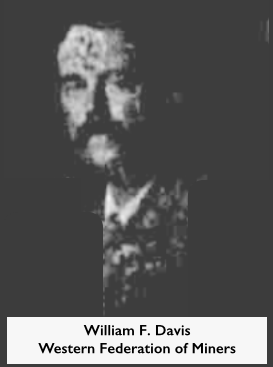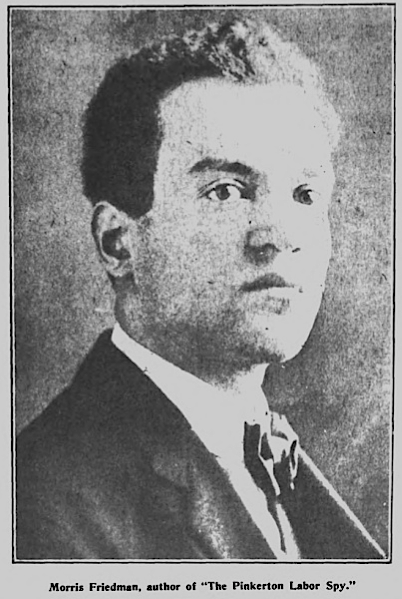If they hang Moyer and Haywood,
they’ve got to hang me.
-Eugene Victor Debs
Hellraisers Journal, Friday July 5, 1907
Boise, Idaho – “The defense is putting up a magnificent case.”
From the Montana News of July 4, 1907:
Union Veterans
—–Reviews History of the Idaho
and Colorado Wars—
Witnesses Tell Experience
of the BullpenBoise, June 28.
On Wednesday afternoon [June 26th] W. F. Davis took the stand. This is one of the most valiant and dauntless characters in the whole ranks of the Western Federation. He was accused of stealing and running the train in the Coeur d’Alenes at the time the mill was blown up. The mine owners declared he was on the engine and directed the engineer, and he has been pursued relentlessly ever since by the persecutions of the mine owners. He was a member of the strike committee in the Cripple Creek district, and was tried with the other members of the committee on the charge of attempted wrecking of a Florence and Cripple Creek train. Davis was dismissed by the judge without letting the case go to the jury. H e was obliged to leave the district when the union men were run out, and change his name in order to get work.
While he was held in jail, his wife and baby both died. He is a big, noble-hearted fellow who has the confidence and sympathy of the entire Federation. He was moved to tears when the fact of the loss of his family were brought out on the stand. He has jeopardized his freedom by coming here from Goldfield, as the mine owners are looking closely for a chance to arrest him for the Coeur d’Alenes difficulties. Orchard implicated him in the blowing up of the Vindicator mine at Cripple Creek, where the two shift bosses were killed. When he read Orchard’s testimony he immediately telegraphed to the attorneys of the defense that he would come to Boise and deny the cowardly lie.
He said the Coeur d’Alenes story of his leading a thousand men to blow up the mill at Wardner was a pure fake. He was not on the train at all, or connected in any way, with the blowing up of the mill. He knew Orchard only slightly, when he came to join the union at Altman of which Davis was president.
He gave a most vivid account of the persecution of the union men; how he was fired for belonging to the union, and blacklisted because he was a union man; how he wandered over the country looking for a chance to work; how the military officers threatened if union meetings were held they would break them up.
He testified that he had advocated peaceful measures both publicly and privately at all times. He told of the prosperity of the union in the Cripple Creek district before it was broken up by the mine owners, aided by the militia—of its fine halls, worth $50,000, its four stores, its libraries, its hospitals.
The cross-examination proved a battle royal between Davis and Borah in which the foxy lawyer went down to defeat before the proletarian giant.
When asked why he was blacklisted, Davis filled with indignation for the wrongs of his class, said because he had signed a petition with 700 men, after seven men had been killed in the mine from rotten timbers giving way, for safer and better conditions.
On Thursday morning [June 27th] the battle royal between the plain, blunt miner and the prostituted advocate of capitalist brutality and greed still continued. The timber thief lawyer attempted to mercilessly bulldoze the witness. Darrow was on his feet watching like a tiger that no undue advantage be taken of him.
Again and again Borah tried to make the witness say that there was trouble in the Cripple Creek prior to the troops being sent in. Davis asserted that all was peaceful. Borah tried to draw out that force and violence were used by the union men against the scabs. It was through Davis that Borah tried to make a case against the unions. He did not succeed. Mr. Davis not only gave his testimony that there never was any cause for such accusations against the unions, but he succeeded in presenting the matter in a clear light so that all could see it.
He gave a graphic tale of the infamies practiced against him; how his people were deported and scattered over the country; how he had been Kangarooed in the courts, and false charges preferred against him.
Borah searchingly asked him regarding the whole history of the Cripple Creek war.
The vagrancy notice issued by the adjutant general was brought into tho limelight. This was one of the most disgraceful official documents ever issued in America. It amounted to a compulsory command to work under conditions the men were not willing to accept.
Borah brought out the assaults made on Floaten and Richardson.
During this dramatic presentation every soul in the court room was alert. The jury missed nothing. They were learning the realities of the great proletarian struggle that flows around our daily lives like a mighty sea ever breaking over its fragile bounds.
—–
On Saturday morning [June 29th] several witnesses from Mullen, Idaho, testified Orchard was playing cards there while the mill was blown up, and was not in Wardner at all. These were Flynn, in whose store the game was played, and Pat McCoyle, who was in the game.
The defense attorneys fought to prove the terrible conditions that prevailed in the Coeur d’Alenes after its occupation by the militia The prosecution fought the introduction of this evidence, but were obliged to be quiescent.
Frank Hough was the man man who was in the bull-pen and gave the testimony. He told of the wretched accommodations, the dysentery that prevailed among the prisoners, the stench in the air, no ventilation, 600 men packed like hogs, and a quarter of them sick, how they could not get out to the one closet, and guarded by colored soldiers.
Simpkins was in this hell of torture and one day for some trifling offense was taken out by these negro troops, and stood in the sun for six hours, and prodded with bayonets when he sank to the ground.
W. Amall, who worked on the Portland mine in Cripple Creek, owned by Jim Burns, which made terms with the union and continued operations by virtue of having its own mill, told of the atrocities perpetrated on the miners after the explosion, and how he escaped from the soldiers and the district after being beaten up.
The sole offense with which he was charged was that he was a friend of the Federation, Jim Burns and the Portland mine.
The sensation of the day on Saturday was the testimony of Morris Friedman, the author of the “Pinkerton Labor Spy.” This young man testified that he had been a stenographer in the employ of the Pinkerton detective agency, and particularly engaged upon the correspondence of James McParland. He handled the reports that came in from the different operators of the agency. These “operators” were known by number, and were employed as union men acting as spotters. His evidence fell as a bomb among the Pinkertons thronging the court room. They never read anything in the way of socialist literature, and had no idea of the revelations Friedman had made in his book.
Geo. Riddell, who was fired from the Denver convention because of his exposure in his book, was standing in the door when Darrow pointed him out with scorn. Great excitement was displayed among the Pinkertons. They gathered in groups whispering, and glared at the young man who so fearlessly and honestly told the simple tale of the black deeds of these human reptiles.
Friedman’s testimony was the master-stroke of the defense so far. It has presented irrefutably documentary evidence of the gigantic conspiracy systematically carried on by the employers against the unions. The unions are honey combed with these creatures that know not the name of shame or honor. They are in all positions of trust, and they report daily to their superior officer.
Friedman had these reports, and they were presented as evidence.
This witness has accomplished a most brave and courageous act. That he has jeopardized his life is conceded by everyone, for these emissaries of darkness know northing but to kill and destroy. It was noticeable that he passed to and from the court-room in company with the defense attorneys.
But the Western Federation men are watchful also, and if anything happens to Friedman a few Pinkertons less will cumber the earth.
James Mooney, and Chris Evans, organizers of the United Mine Workers, who were beaten up by the Pinkerton thugs during the strike at Trinidad, [identified?] Gregory aa one of the thugs. […?]
Thereon, Stevens, formerly district judge at Telluride, gave evidence as to the violation of the rules of the court by Bulkley Wells, Sherman Bell and the Citizens’ Alliance. he told of the business men demanding the troops when all was peaceful, of the deportations, and other incidents of that reign of terror.
The defense is putting up a magnificent case. The character of their witnesses, the startling disclosures against the employers, the strong documentary evidence, the careful covering of every accusing point have made a showing by which it may be said to all reasonable appearance that Haywood’s life is safe.
IDA CROUCH-HAZLETT.
———-
[Emphasis and photographs added.]
SOURCES
Montana News
(Helena, Montana)
-July 4, 1907
http://chroniclingamerica.loc.gov/lccn/sn84024811/1907-07-04/ed-1/seq-1/
http://chroniclingamerica.loc.gov/lccn/sn84024811/1907-07-04/ed-1/seq-4/
Deseret Evening News
(Salt Lake City, Utah)
-June 29, 1907
(Source used to verify those who testified for defense on June 29, 1907. Altho Crouch-Hazlett dated this article as June 28th, when she begins to report those who testified on “Saturday,” she means Saturday June 29th.)
http://chroniclingamerica.loc.gov/lccn/sn83045555/1907-06-29/ed-1/seq-1/
http://chroniclingamerica.loc.gov/lccn/sn83045555/1907-06-29/ed-1/seq-2/
IMAGES
HMP, WF Davis (Big Bill Davis) of WFM, DEN, June 28, 1907
http://chroniclingamerica.loc.gov/lccn/sn83045555/1907-06-28/ed-1/seq-1/
HMP, Morris Friedman, Pinkerton Labor Spy, Wilshires, June 1907
https://babel.hathitrust.org/cgi/pt?id=iau.31858037309105;view=image;seq=154
See also:
Darrow Collection: Haywood Trial
http://moses.law.umn.edu/darrow/trials.php?tid=3
Trial Transcripts, Haywood Trial, Volume 5, pp 2124 – 2839
June 25, 26, 27, 28, 29, 1907.
Note: pdf, slow to load.
http://moses.law.umn.edu/darrow/documents/Vol_5_Haywood_Transcript_p_2124_2839.pdf
The Cripple Creek Strike by Emma F Langdon
-from Rebel Graphics (RIP FW Richard Myers)
Note: Links on the left can be used for more information on the testimony reported above. Also, scroll down to Appendix for links to the Haywood-Moyer-Pettibone Case.
http://www.rebelgraphics.org/wfmhall/langdon00.html
The Pinkerton Labor Spy by Morris Friedman
http://www.rebelgraphics.org/wfmhall/pinkertonlaborspy00.html


